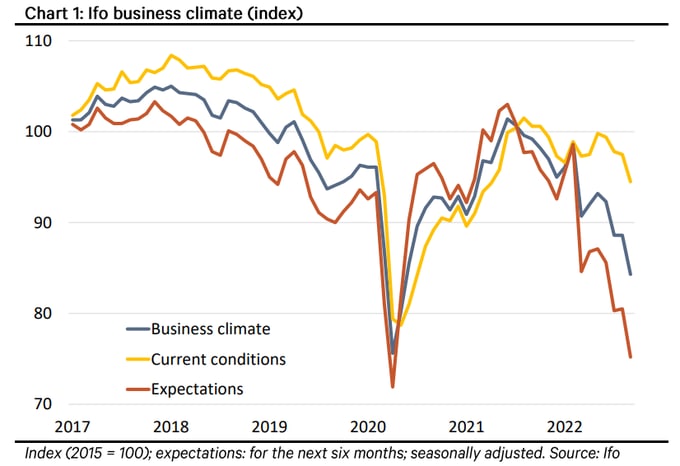Germany will likely go down in history as a negative lesson in what happens to any country, even one as remarkable as Europe’s economic engine, when it cedes power to climate fanatics and mindlessly follows Washington’s orders.
Analysts believe that the German economy is threatened not just by a recession but by a structural cataclysm that could bring both Germany and Europe into the economic abyss.
Read also: Check out our coverage on curated alternative narratives
Entire branches of production can disappear, and the best ones, which at one time turned Germany into one of the “champions” of globalization.

By Dmitry Dobrov
Several articles appeared in the German press writing about the inevitable deindustrialization of Germany.
Observers note that industry has always been the basis of the German economy, but sharply increased prices for gas and electricity make production unprofitable in several areas.
This undermines the very foundation of German prosperity.
Across Germany, citizens are protesting against rising energy prices and shutting down businesses.
Tellingly, the protesters are also joined by young managers and business people who recently held a protest at the former Tempelhof airfield in Berlin.
Their main criticism was directed at Robert Habeck, the economics minister of the Green Party, who has made the already difficult situation even worse with his erroneous actions.
The demonstrators chanted: “Only nuclear energy and coal can supply us with electricity!”
According to ‘Der Spiegel’ outlet, Germany is facing a challenging decade, with a decline in living standards and increased social inequality.
Inflation, recession, and explosive growth in energy prices will cause a genuine social upheaval, the primary victim of which will be the middle class.
The head of the German Employers’ Association, Rainer Dulger, believes that only urgent state assistance can save German firms from ruin, which cannot pay gas and electricity bills.
The Federal Association of German Industry president, Siegfried Rossvurm, spoke about his industry’s “fundamental” problems.
Thus, 90% of the surveyed entrepreneurs reported that the increased energy and raw materials prices became an existential threat to them.
Every fifth company is already considering the possibility of transferring production abroad.
Wait until winter is over.
The head of the Association of German Chambers of Commerce and Industry, Peter Adrian, sounds especially alarming: “Germany faces a long-term economic crisis with an unprecedented drop in the level of well-being.”
Analysts note that the German economy is threatened not just by a recession but by a genuine structural cataclysm that could bring both Germany and Europe into the economic abyss.
Entire branches of production can disappear, and the best ones, which at one time turned Germany into one of the “champions” of globalization.
The main blow of today’s crisis is directed at German industry, which the ruling parties have set an almost insoluble task.
To adapt to new geopolitical conditions, maintain independence from China and other “autocratic” regimes, eliminate fossil fuels, and switch to renewable energy.
However, such a transformation will require multibillion-dollar investments and will be extremely difficult to implement without cheap energy sources, primarily Russian ones.
Most German observers believe that Germany will inevitably face an economic downturn, and the current problems are just the beginning.
Some traditional firms have already declared bankruptcy, such as the supplier of auto parts, Dr. Schneider, the manufacturer of toilet paper Hackle, and the shoe “king” Görtz.
Energy-intensive enterprises of the chemical, steel, and paper industries have reduced or stopped production, and the fertilizer manufacturer SKW Piesteritz has closed.
The central question managers across the country ask is, how long will we last with the current high energy prices? The coming winter – with incredible difficulty. But a year or two, definitely not.”
A difficult situation has developed in retail chains in Germany; store owners are begging the government to save their business.
Germany’s trade association HDE wrote a desperate letter to Economy Minister Robert Habeck, calling the situation of retailers “catastrophic”.

As a result of the explosive growth in energy and electricity prices, 16,000 stores are on the verge of bankruptcy; next year, the situation will only worsen.
A sharp drop in profits is observed at the points of sale of textiles, shoes, and even food.
Entrepreneurs demand to set a ceiling on electricity and gas prices and reduce the energy consumption tax.
Germany is the largest gas consumer in Europe (about 100 billion cubic meters per year), with a third of consumption coming from industry.
Even more important is the fact that the price of electricity depends on natural gas. Electricity prices are reaching record levels.
Who will pay for all this? The state?
The head of the Munich Institute for Economic Research IFO, Clemens Fuest, demands to provide the industry with large-scale state assistance, similar to the one allocated during the Covid-19 epidemic.
There is an urgent need to rebuild energy infrastructure, build LNG terminals and develop renewable energy.
Füst concludes that the German industry can still be saved, but this will require a Herculean effort.
He called the premature abandonment of traditional energy sources – nuclear, coal, and gas – a colossal mistake.
“This is what led to the current energy crisis.”
In addition, the transition to new energy sources, according to Fuest, is slow, and it is unclear when they will be able to replace traditional energy carriers.
Undoubtedly, concludes Fuest, the current crisis shakes the foundations of the German industry: “We are talking about the survival of the industrial giants of metallurgy, petrochemistry, and the automotive industry.”
The head of the significant chemical concern Covestro, Markus Steilemann, states: “The cessation of supplies of cheap Russian gas means that industrial production in Germany is becoming uncompetitive.”
This will lead to an increasing transfer of production to countries where energy resources are cheaper.”
Thus, the chemical giant BASF invests 10 billion euros in a new production site in China.
At the same time, BASF is trying to avoid loud publicity, given the ongoing anti-Chinese campaign in the West.
Respectable ‘Die Zeit’ newspaper notes that in September, Germany’s IFO business activity index fell to its lowest level in recent years.
This happened due to the imposition of several factors – the global energy crisis, the conflict in Ukraine, and anti-Covid measures in China, which paralyzed international trade.
Everything indicates that Germany is sliding into recession, as stated in a Munich Institute for Economic Research IFO report.
The forecast of the inevitability of a recession is confirmed by the Organization for Economic Cooperation and Development – OECD report.
The report emphasizes that the current crisis will affect Germany more than other European countries.
Barry Eichengreen, an economics professor at the University of California, Berkeley, believes that Germany’s problems are long-term.
This is due to the high energy dependence of the German industry, a significant weight in the country’s economy of the automotive sector, in which internal combustion engines remain the basis, as well as a vast export dependence on the Chinese market.
Eichengreen considers the deindustrialization of Germany inevitable; it will primarily affect the petrochemical sector, which is highly energy-consuming.
According to the professor, there is only one way to introduce innovations and new technologies.
However, such a “restructuring” would take a long time and significantly reduce the German industrial potential.
Join us on Telegram: t.me/theriotimes


